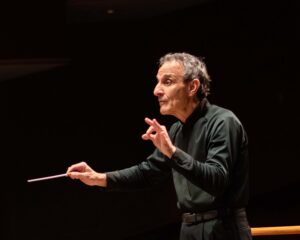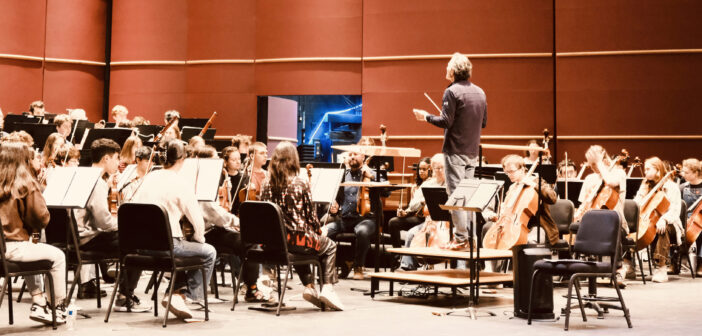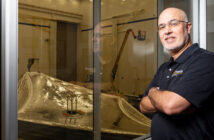There are conductors who compose and composers who conduct. Music professor Paul Salerni claims to be the latter. But with his 45 years at Lehigh coming to a close, he looks back having done much more than just compose or conduct music.
Though he will be retiring at the end of this year, Salerni, who has composed and conducted music and been a prominent leader in the musical corners of Lehigh, looks forward to retiring after an eventful musical and work life.
Salerni grew up in a household with two working-class parents who were musicians in the small industrial town of New Britain, Connecticut.
He said New Britain was known at the time for its half-Italian-American and half-Polish-American population. This meant there were many accordion players because it’s a common instrument shared between both cultures. So when an accordion teacher came to his door and asked if he wanted to take lessons, Salerni’s parents said yes.

Music professor Paul Salerni has been teaching various classes at Lehigh for the last 45 years. Salerni is credited with starting the Lehigh University Very Modern Ensemble, also known as LUVME. He will be retiring at the end of this academic year. (Courtesy of Paul Salerni)
Salerni said he played the accordion for four to five years before picking up the drums and piano in elementary school.
“The rest has been a long series of doing things musically,” Salerni said.
Soon after, he decided he wanted not only to play music but to write it.
Around that time, Salerni said he read a biography of Wolfgang Amadeus Mozart, now his favorite composer, which instantly fascinated and inspired him.
At 14 years old, Salerni conducted his first self-written piece while attending a rival high school’s band camp.
Salerni went on to complete his undergraduate degree at Amherst College before attending Harvard University for his master’s and doctorate in composition.
While at Harvard, Salerni became interested in opera. During his fourth year, he said he conducted his first opera with his colleague, Louis Karchin, called “The Abduction from the Seraglio” by Mozart.
His teacher at the time, Earl Kim, also conducted Mozart and came to Salerni’s opera. He noticed Salerni’s conducting abilities, as well as his girlfriend’s role as stage director, so Kim convinced them to help him with his “big project of the moment,” which was an evening-long series of musical settings of texts by 20th-century playwright, novelist and poet Samuel Beckett.
Salerni said he spent every hour of the day with Kim’s production, valuing what he learned from watching Kim operate — experiencing his standards and musicality soon became the most important inspiration in his musical life.
After graduating from Harvard, Salerni married his girlfriend and moved from Cambridge, Massachusetts, to Bethlehem where he started his career at Lehigh teaching composition and directing the wind ensemble.
In 1979, there was only a small string orchestra, so Salerni started the Lehigh University Very Modern Ensemble, also known as LUVME. Salerni said he has a passion for creating new ensembles and has started ensembles at both Amherst and Harvard.
When he arrived at Lehigh, he said the university was in a state of flux, causing him to look for other jobs. However, he changed his mind when Peter Likins, the new president at the time, came to Lehigh.
He said Likins “righted the ship” and saw the value in young professors such as himself.
Salerni said he liked Likins so much because of his dedication to creating the Zoellner Arts Center.
“He put himself on the line to get this done,” Salerni said. “It changed our lives immeasurably. Since then, we’ve always had the support of the administrators.”
Besides theory and composition courses, Salerni has since taught some of his favorite classes such as Italian Opera, Jazz History and Words, and Music.
Along with this, Salerni is the conductor and director of the Lehigh University Philharmonic Orchestra.
“He’s very passionate, and he loves what he’s doing,” said orchestra cellist Ella Rossetti, ‘25. “But he’s also having a good time. We’re cracking jokes, and we have references nobody else would understand.”
Salerni said he dreams for his orchestra of students and other members of the community to perform at the Lehigh basketball halftime show before he retires.
Salerni said he finds inspiration for his compositions in nature and places, such as the Lehigh Valley, his backyard and Italy, where he wishes to spend more time in his retirement, among other travel destinations.
Musically, Salerni is inspired by Mozart, his teacher Kim and jazz trumpet player Miles Davis. He said his own pieces straddle the line between proper jazz and classical music.
His work extends beyond campus grounds.
The Lehigh Valley Chamber Orchestra and the Scranton NPR-PBS station have commissioned multiple musical pieces from Salerni. In 2017 and 2018, Salerni released one new song a week on YouTube — so now, with a collection of 72 songs, he hopes to release 72 days of compositions in a row.
“Salerni’s got a lot of experience doing composition as a job, so he has stories about real, practical things that he had to think about in his career,” said composition student Andrew McKenna, ‘24. “Many of the musical professors know about theory, but he has all the experience of many years of doing composition.”
McKenna said he appreciates what Salerni has provided him as a professor, by giving him effective advice without “trampling” on or completely changing the work.
“He taught me everything I know about composing,” McKenna said.
Salerni said Lehigh wasn’t known for its arts programs when he first joined the faculty and community, but the institution has still been supportive of him across his roles as a professor, instrumentalist and composer.
“Composers need to hear their music in order to make it better and to know how it is affecting other human beings,” Salerni said. “So I’m extremely grateful to Lehigh for supporting me for all these years.”






Comment policy
Comments posted to The Brown and White website are reviewed by a moderator before being approved. Incendiary speech or harassing language, including comments targeted at individuals, may be deemed unacceptable and not published. Spam and other soliciting will also be declined.
The Brown and White also reserves the right to not publish entirely anonymous comments.